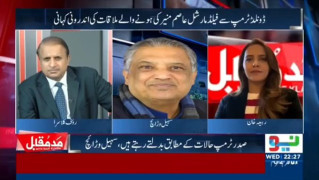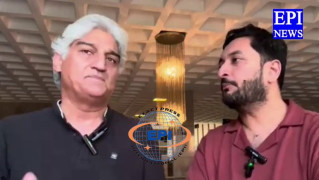[h=1]Dina Wadia[/h]From Wikipedia, the free encyclopedia
[TABLE="class: infobox biography vcard, width: 22"]
[TR]
[TH="colspan: 2, align: center"]Dina Jinnah[/TH]
[/TR]
[TR]
[TH]Born[/TH]
[TD]Dina Muhammad Ali Jinnah
August 15, 1919 (age 95)
London, United Kingdom[/TD]
[/TR]
[TR]
[TH]Religion[/TH]
[TD="class: category"]Zoroastrian[/TD]
[/TR]
[TR]
[TH]Spouse(s)[/TH]
[TD]Neville Wadia married:1931-1996 (his death)[/TD]
[/TR]
[TR]
[TH]Children[/TH]
[TD]Nusli Wadia[/TD]
[/TR]
[TR]
[TH]Parents[/TH]
[TD]Muhammad Ali Jinnah (father)
Maryam Jinnah (mother)[/TD]
[/TR]
[TR]
[TH]Relatives[/TH]
[TD]Fatima Jinnah (aunt)
Shireen Jinnah (aunt)
Ness Wadia (grand son)
Jehangir Wadia (grand son)[/TD]
[/TR]
[/TABLE]
Dina Jinnah (born Dina Jinnah August 15, 1919) is the daughter of Quaid e Azam Muhammad Ali Jinnah, the Founder of Pakistan.
[h=2]Early life[edit][/h]See also: Jinnah family
Dina was born in London shortly after midnight on the morning of August 15, 1919. Dina was raised as a Muslim. She is the daughter of Muhammad Ali Jinnah, andMaryam Jinnah and the niece of Fatima Jinnah and Shireen Jinnah.
Stanley Wolpert's Jinnah of Pakistan records: that " Her premature arrival was unexpectedher parents were at the theatre, but "were obliged to leave their box hurriedly." She was a dark-eyed beauty, lithe and winsome. She had her mother's smile and was pert or petulant as only an adored.
According to Wolpert, referring to Jinnah's time in London in 1930-33, "Dina was [Jinnah's] sole comfort, but Dina was away at school most of the time and home only for brief times, yet still the pampered daughter could be a joy to her doting father. He had two dogs, one formidable black Doberman, the other a white West Highland Terrier".
In November 1932, Jinnah read H. C. Armstrong's biography of Kemal Atatrk, Grey Wolf, and seemed to have found his own reflection in the story of Turkey's great modernist leader. It was all he talked about for a while at home, even to Dina, who consequently nicknamed him 'Grey Wolf'. Being only thirteen, her way of pestering him to take her to High Road to see Punch and Judy was, "Come on, Grey Wolf, take me to a pantomime; after all, I am on my holidays." [Wolpert]
[h=2]Rift with her father[edit][/h]Dina's relationship with her father became strained when Dina expressed her desire to marry a Parsi-born Indian Neville Wadia. Jinnah, a Muslim, tried to dissuade her, but failed. Mahommedali Currim Chagla, who was Jinnah's assistant at the time, recalls: "Jinnah, in his usual imperious manner, told her that there were millions of Muslim boys in India, and she could have anyone she chose. Reminding her father that his wife (Dina's mother Rattanbai), had also been a non-Muslim, a Parsi also coincidently, the young lady replied: 'Father, there were millions of Muslim girls in India. Why did you not marry one of them?' And he replied that, 'She became a Muslim'".
It is said (by Jinnah's associate M C Chagla in "Roses in December") that when Dina married Neville, Jinnah said to her that she was not his daughter any more. It has not been corroborated by any other source. Jinnah allegedly disowned her and the father-daughter relationship became extremely formal after she married. But the legal notice of disowning never came, which is essential for such purposes. They did correspond, but he addressed her formally as 'Mrs. Wadia'. Dina and Neville lived in Mumbai and had two children, a boy and a girl. Dina did not travel to Pakistan until her father's funeral in Karachi in September 1948. Their relationship is a matter of legal conjecture and hair splitting as Pakistani laws allow for a person to be disinherited for violating Islamic rules (in this case by a Muslim woman marrying a non-Muslim), hence no claim on the Pakistani properties of Jinnah, and Indian laws recognizing religion's traditional succession rules to operate.
[h=2]Jinnah mansion dispute[edit][/h]After Jinnah returned to Mumbai from England to take charge of the Muslim League, he built himself a palatial mansion South Court ("Jinnah House") in Mumbai, which became his residence during the politically momentous decade preceding the creation of Pakistan. The house was designed by Claude Batley, a British architect, and was built in 1936 at a total cost of Rs. 200,000/-. The 2.5 acre (10,000 m) property, "South Court", overlooking the sea and located at 2, Bhausaheb Hirey Marg (then Mount Pleasant Road), Malabar Hill, is in Mumbai's most expensive real estate. In 1948, it was leased to the British Deputy High Commission which occupied it till 1982.
Successive Pakistan's Government have often expressed deep interest in acquiring the property free of charge for sentimental reasons. During his visit to India, President Pervez Musharraf had renewed Pakistan's claim to the house which the president had suggested to Indian Prime Minister Atal Bihari Vajpayee should be given to Pakistan so that it could be turned into a consulate.
However, this came to naught: Dina Wadia who lived in New York, wrote to the Indian prime minister demanding that the house on the Malabar Hill, now worth $60 million, be handed over to her.[SUP][citation needed][/SUP]
Through her counsel, she has argued that Muslim Law for inheritance did not apply to her father Jinnah, a Khoja Shia but instead Hindu customary law applied, as ruled by the Supreme Court of India in previous cases.[SUP][1][/SUP]
[h=2]Present times[edit][/h]See also: Wadia family
In March 2004, Dina came to Lahore, Pakistan to watch a cricket match between Pakistan and India. She considered "cricket diplomacy" to be an enthralling dimension that illustrated an entirely new phase in relations between India and Pakistan. But she and her son Nusli Wadia chose not to share their thoughts with the public on what was certainly a highly emotional encounter. Dina had not traveled to Pakistan since her father's funeral in September 1948. A great sense of drama was embedded in an old woman's visit, as a foreigner, to a country that was founded by her father.
Dina, her son Nusli Wadia and grandsons Ness Wadia and Jehangir Wadia visited the mausoleum of her father to pay homage. She also visited the museum located within the premises of the mausoleum and saw the articles used by her father. In the visitors' book, Dina wrote: "This has been very sad and wonderful for me. May his dream for Pakistan come true." This would appear to be a very appropriate summation of a life-experience that is essentially inexplicable. Reports said that she asked for copies of three pictures she saw in the mausoleum's antiquities room. In one picture, she is standing with her father and aunt, Fatima Jinnah. The other is a painting of her mother, Maryam Jinnah. In the third, her father is dictating a letter, showing Mohammad Ali Jinnah's political persona.
She also went to the tomb of Madar-e-Millat Fatima Jinnah to pay respects to her aunt and Flagstaff House Pakistan to host the flag of Pakistan and her father's houseWazir Mansion.[SUP][2]
[/SUP]
Ness Wadia (born 30 May 1970) is an Indian businessman belonging to the Wadia family. He is currently the Managing Director of the Bombay Burmah Trading Corporation, a company which has holdings in most of the Wadia Group subsidiaries, including an indirect majority stake in Britannia Industries.[SUP][1][/SUP][SUP][2][/SUP] He was the Joint Managing Director of Bombay Dyeing, the flagship company of the Wadia Group,[SUP][3][/SUP][SUP][4][/SUP] till March 2011 when he stepped down from the post. Wadia is a co-owner of the Indian Premier League cricket team Kings XI Punjab along with actress Preity Zinta.
http://en.wikipedia.org/wiki/Ness_Wadia
[TABLE="class: infobox biography vcard, width: 22"]
[TR]
[TH="colspan: 2, align: center"]Dina Jinnah[/TH]
[/TR]
[TR]
[TH]Born[/TH]
[TD]Dina Muhammad Ali Jinnah
August 15, 1919 (age 95)
London, United Kingdom[/TD]
[/TR]
[TR]
[TH]Religion[/TH]
[TD="class: category"]Zoroastrian[/TD]
[/TR]
[TR]
[TH]Spouse(s)[/TH]
[TD]Neville Wadia married:1931-1996 (his death)[/TD]
[/TR]
[TR]
[TH]Children[/TH]
[TD]Nusli Wadia[/TD]
[/TR]
[TR]
[TH]Parents[/TH]
[TD]Muhammad Ali Jinnah (father)
Maryam Jinnah (mother)[/TD]
[/TR]
[TR]
[TH]Relatives[/TH]
[TD]Fatima Jinnah (aunt)
Shireen Jinnah (aunt)
Ness Wadia (grand son)
Jehangir Wadia (grand son)[/TD]
[/TR]
[/TABLE]
Dina Jinnah (born Dina Jinnah August 15, 1919) is the daughter of Quaid e Azam Muhammad Ali Jinnah, the Founder of Pakistan.
[h=2]Early life[edit][/h]See also: Jinnah family
Dina was born in London shortly after midnight on the morning of August 15, 1919. Dina was raised as a Muslim. She is the daughter of Muhammad Ali Jinnah, andMaryam Jinnah and the niece of Fatima Jinnah and Shireen Jinnah.
Stanley Wolpert's Jinnah of Pakistan records: that " Her premature arrival was unexpectedher parents were at the theatre, but "were obliged to leave their box hurriedly." She was a dark-eyed beauty, lithe and winsome. She had her mother's smile and was pert or petulant as only an adored.
According to Wolpert, referring to Jinnah's time in London in 1930-33, "Dina was [Jinnah's] sole comfort, but Dina was away at school most of the time and home only for brief times, yet still the pampered daughter could be a joy to her doting father. He had two dogs, one formidable black Doberman, the other a white West Highland Terrier".
In November 1932, Jinnah read H. C. Armstrong's biography of Kemal Atatrk, Grey Wolf, and seemed to have found his own reflection in the story of Turkey's great modernist leader. It was all he talked about for a while at home, even to Dina, who consequently nicknamed him 'Grey Wolf'. Being only thirteen, her way of pestering him to take her to High Road to see Punch and Judy was, "Come on, Grey Wolf, take me to a pantomime; after all, I am on my holidays." [Wolpert]
[h=2]Rift with her father[edit][/h]Dina's relationship with her father became strained when Dina expressed her desire to marry a Parsi-born Indian Neville Wadia. Jinnah, a Muslim, tried to dissuade her, but failed. Mahommedali Currim Chagla, who was Jinnah's assistant at the time, recalls: "Jinnah, in his usual imperious manner, told her that there were millions of Muslim boys in India, and she could have anyone she chose. Reminding her father that his wife (Dina's mother Rattanbai), had also been a non-Muslim, a Parsi also coincidently, the young lady replied: 'Father, there were millions of Muslim girls in India. Why did you not marry one of them?' And he replied that, 'She became a Muslim'".
It is said (by Jinnah's associate M C Chagla in "Roses in December") that when Dina married Neville, Jinnah said to her that she was not his daughter any more. It has not been corroborated by any other source. Jinnah allegedly disowned her and the father-daughter relationship became extremely formal after she married. But the legal notice of disowning never came, which is essential for such purposes. They did correspond, but he addressed her formally as 'Mrs. Wadia'. Dina and Neville lived in Mumbai and had two children, a boy and a girl. Dina did not travel to Pakistan until her father's funeral in Karachi in September 1948. Their relationship is a matter of legal conjecture and hair splitting as Pakistani laws allow for a person to be disinherited for violating Islamic rules (in this case by a Muslim woman marrying a non-Muslim), hence no claim on the Pakistani properties of Jinnah, and Indian laws recognizing religion's traditional succession rules to operate.
[h=2]Jinnah mansion dispute[edit][/h]After Jinnah returned to Mumbai from England to take charge of the Muslim League, he built himself a palatial mansion South Court ("Jinnah House") in Mumbai, which became his residence during the politically momentous decade preceding the creation of Pakistan. The house was designed by Claude Batley, a British architect, and was built in 1936 at a total cost of Rs. 200,000/-. The 2.5 acre (10,000 m) property, "South Court", overlooking the sea and located at 2, Bhausaheb Hirey Marg (then Mount Pleasant Road), Malabar Hill, is in Mumbai's most expensive real estate. In 1948, it was leased to the British Deputy High Commission which occupied it till 1982.
Successive Pakistan's Government have often expressed deep interest in acquiring the property free of charge for sentimental reasons. During his visit to India, President Pervez Musharraf had renewed Pakistan's claim to the house which the president had suggested to Indian Prime Minister Atal Bihari Vajpayee should be given to Pakistan so that it could be turned into a consulate.
However, this came to naught: Dina Wadia who lived in New York, wrote to the Indian prime minister demanding that the house on the Malabar Hill, now worth $60 million, be handed over to her.[SUP][citation needed][/SUP]
Through her counsel, she has argued that Muslim Law for inheritance did not apply to her father Jinnah, a Khoja Shia but instead Hindu customary law applied, as ruled by the Supreme Court of India in previous cases.[SUP][1][/SUP]
[h=2]Present times[edit][/h]See also: Wadia family
In March 2004, Dina came to Lahore, Pakistan to watch a cricket match between Pakistan and India. She considered "cricket diplomacy" to be an enthralling dimension that illustrated an entirely new phase in relations between India and Pakistan. But she and her son Nusli Wadia chose not to share their thoughts with the public on what was certainly a highly emotional encounter. Dina had not traveled to Pakistan since her father's funeral in September 1948. A great sense of drama was embedded in an old woman's visit, as a foreigner, to a country that was founded by her father.
Dina, her son Nusli Wadia and grandsons Ness Wadia and Jehangir Wadia visited the mausoleum of her father to pay homage. She also visited the museum located within the premises of the mausoleum and saw the articles used by her father. In the visitors' book, Dina wrote: "This has been very sad and wonderful for me. May his dream for Pakistan come true." This would appear to be a very appropriate summation of a life-experience that is essentially inexplicable. Reports said that she asked for copies of three pictures she saw in the mausoleum's antiquities room. In one picture, she is standing with her father and aunt, Fatima Jinnah. The other is a painting of her mother, Maryam Jinnah. In the third, her father is dictating a letter, showing Mohammad Ali Jinnah's political persona.
She also went to the tomb of Madar-e-Millat Fatima Jinnah to pay respects to her aunt and Flagstaff House Pakistan to host the flag of Pakistan and her father's houseWazir Mansion.[SUP][2]
[/SUP]
Ness Wadia (born 30 May 1970) is an Indian businessman belonging to the Wadia family. He is currently the Managing Director of the Bombay Burmah Trading Corporation, a company which has holdings in most of the Wadia Group subsidiaries, including an indirect majority stake in Britannia Industries.[SUP][1][/SUP][SUP][2][/SUP] He was the Joint Managing Director of Bombay Dyeing, the flagship company of the Wadia Group,[SUP][3][/SUP][SUP][4][/SUP] till March 2011 when he stepped down from the post. Wadia is a co-owner of the Indian Premier League cricket team Kings XI Punjab along with actress Preity Zinta.
http://en.wikipedia.org/wiki/Ness_Wadia































